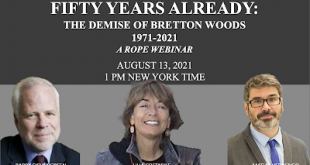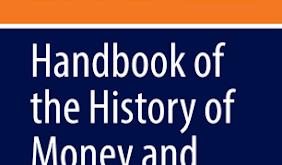[embedded content] End of Bretton Woods with Barry Eichengreen, myself and Lilia Costabile, organized by L-P. Rochon and the Review of Political Economy.
Read More »Nixon ends dollar convertibility
50 years ago this Sunday. A debate with Barry Eichengreen on that today at 1pm NY time, and you can register here. [embedded content]My paper can be read here.
Read More »The Demise of Bretton Woods
ROPE will be hosting a special Zoom Webinar, hosted by Lilia Costabile. The webinar is on August 13, 2021, at 1 pm, NY time (Bretton Wood collapsed on August 15, 1971) . To register, please use the following link.
Read More »Handbook of the History of Money and Currency
The Handbook (subscription required) has been edited by Stefano Battilossi, Youssef Cassis and Kazuhiko Yago. It has many interesting chapters. Barry Eichengreen writes on what determines that a currency is used as an international currency (or even as the predominant currency). While he follows conventional views in suggesting that role of money as a means of exchange and the importance of the country in international transactions, he does also explore the role of power (military power)...
Read More »Economists don’t read (enough) books
So Ann Petiffor twitted a link to a post on why economists do not read Polanyi's The Great Transformation (or the other GT; yes the one is Keynes' General Theory) The author, Marko Grdesic, basically suggests that economists do not read books, period.* I would add, let alone Polanyi that was always at the fringes of mainstream economics. He estimates that about 3 percent of economists have read Polanyi. That reminded me of a story that Eichengreen had told me about a course he taught...
Read More »The Great Depression and the Great Recession compared
So I teach a course on the two (old syllabus here). One of the initial classes looks at Eichengreen and O'Rourke's comparison of the two events, and how, even though at the beginning the shock seemed similar, the recovery has been faster the second time. O'Rourke had noticed in his blog last year that the current recovery started way before, but has been so slow that now the 1930s look better when industrial output (rather than GDP) is used as a measure. Below the same data for the US...
Read More »The end of the Gold Standard
NYTimes September 21, 1931 84 years ago Britain left the Gold Standard. Some thought it was the end of Western civilization. Keynes thought it was the beginning of the end of the Depression, at least in Great Britain. He was certainly happy. He said: "There are few Englishmen who do not rejoice at the breaking of our gold fetters. We feel that we have at last a free hand to do what is sensible. The romantic phase is over, and we can begin to discuss realistically what policy is for the...
Read More » Heterodox
Heterodox





